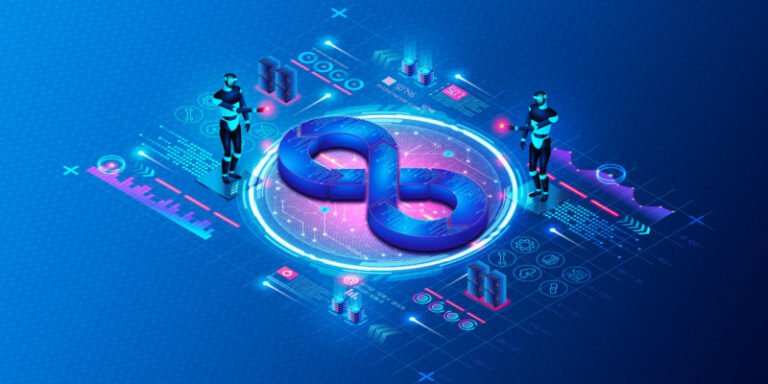In the current landscape of 2023, the integration of machine learning (ML) into significant projects has become more prevalent. Developers are now directing their attention towards implementing successful ML projects and confidently deploying them into production.
This is where MLOps, short for machine learning operations, comes into play. It is closely linked with DevOps, its predecessor. While DevOps aims to enhance the overall software development process, MLOps focuses specifically on developing and deploying ML models. Despite their distinct focuses, these two methodologies have several similarities and differences.
Embarking on a comprehensive MLOps program, such as the IISC MLOps course, is vital for career growth. It equips professionals with the skills needed to navigate the complexities of modern machine learning operations, preparing them for high-demand roles in the field.
Let’s explore the intricacies of DevOps and MLOps, their individual characteristics, and how they intersect in modern project management.
What is MLOps?
MLOps, or Machine Learning Operations, is pivotal for managing the end-to-end lifecycle of machine learning models in real-world environments. It seamlessly integrates the principles of DevOps into machine learning workflows, ensuring efficient development, deployment, and ongoing management of ML models.
To facilitate MLOps tasks, various tools and platforms offer a wide array of features, catering to different aspects of the ML lifecycle:
- TensorFlow Extended (TFX): This platform is specifically designed to create scalable ML production pipelines and provide robust support for model development, deployment, and monitoring.
- Kubeflow: As a Kubernetes-native platform, Kubeflow simplifies the orchestration of ML workflows, enabling seamless scaling and deployment of ML applications in containerised environments.
- Apache Airflow: A versatile workflow automation and scheduling tool, Apache Airflow is highly adaptable for ML tasks, allowing users to build, schedule, and monitor complex ML pipelines with ease.
- MLflow: MLflow is an open-source platform that offers comprehensive support for experiment tracking, model management, and deployment. It empowers users to effectively manage the entire ML lifecycle, from experimentation to production deployment.
- Databricks: Databricks is a unified analytics platform that integrates data engineering, ML, and analytics, providing a collaborative environment for data scientists and engineers to develop, train, and deploy ML models at scale.
- H20.ai: H20.ai offers AI and machine learning solutions tailored for data-driven enterprises, providing advanced algorithms and tools to accelerate model development and deployment.
- AWS SageMaker: Amazon SageMaker is a fully managed ML service that simplifies the process of building, training, and deploying ML models at scale on the AWS cloud platform. It enables users to rapidly iterate and deploy models with ease.
- These platforms play a crucial role in enabling organisations to effectively implement MLOps practices, ensuring the seamless integration of machine learning into their business operations.
Mastering MLOps: Essential Guidelines for Success
Implementing MLOps effectively requires adherence to essential best practices to ensure the seamless integration of machine learning into your business operations. Here are some critical guidelines to follow:
- Embrace Automation: Automate MLOps processes wherever possible to minimise the risk of human error and enhance overall efficiency. You can streamline workflows and accelerate the development cycle by automating repetitive tasks such as data preprocessing, model training, and deployment.
- Track Experiments and Versions: Implement robust experiment tracking and version control mechanisms to monitor model development, iterations, and performance metrics over time. This ensures reproducibility, transparency, and accountability throughout the ML lifecycle, facilitating collaboration and decision-making.
- Leverage CI/CD Pipelines: Deploy ML models through continuous integration and continuous deployment (CI/CD) pipelines to enable rapid and reliable delivery of updates and changes to production environments. CI/CD pipelines automate ML models’ testing, validation, and deployment, allowing for seamless integration with existing software development practices.
- Design for Scalability and Performance: Design and deploy ML models with scalability and performance in mind to meet the demands of production environments. Ensure that models are optimised for speed, efficiency, and resource utilisation, allowing them to handle large data volumes and simultaneously serve multiple users.
- Adhering to these best practices, organizations can effectively harness the power of MLOps to drive innovation, accelerate time to market, and achieve business success in the era of machine learning.
Breaking down MLOps and DevOps
MLOps, or Machine Learning Operations, involves deploying, managing, and scaling machine learning models in production environments. It blends DevOps and machine learning practices to streamline the entire lifecycle, from development to deployment and monitoring. MLOps ensures efficient and reliable deployment of models at scale, with continuous integration and monitoring to uphold performance. Collaboration among data scientists, ML engineers, and IT operations teams is critical for automating and optimising the deployment and management of ML models in real-world applications.
Similarities Between MLOps and DevOps
Since MLOps falls under the umbrella of DevOps, there are several commonalities between the two:
- Collaboration: MLOps and DevOps stress the need for teamwork among development, operations, and data science teams to ensure the efficient delivery of models and applications.
- Integration: Many MLOps tools and platforms seamlessly integrate with existing DevOps toolchains like Git, Jenkins, and Kubernetes, facilitating the incorporation of MLOps into current DevOps workflows.
- Experimentation: MLOps and DevOps foster a culture of experimentation, enabling teams to swiftly test and validate novel ideas and methods, thereby minimising the time and cost involved in introducing new features and functionalities.
- Monitoring: MLOps and DevOps prioritise continuous monitoring and feedback loops to verify that models and applications perform as expected and promptly address any issues.
A concise comparison will also elucidate the fundamental aspects of DevOps and MLOps.
Differences Between MLOps and DevOps:
DevOps:
- Focuses on the entire software development process.
- Emphasises collaboration and communication between development, testing, and operations teams.
- Prioritises overall application performance and reliability.
- Involves tasks such as testing and deployment automation.
- Executes tasks like infrastructure provisioning and configuration management.
MLOps:
- Focuses specifically on machine learning models and their deployment.
- Emphasizes data management and model versioning.
- Prioritizes model performance in production and monitoring.
- Involves tasks such as hyperparameter tuning and feature selection.
- Executes tasks such as model interpretability and fairness.
- It’s important to note that MLOps and DevOps are not mutually exclusive, and many organisations will utilise a blend of both practices to enhance their software development processes.
So, let’s explore how to bridge the gap between these two methodologies.
Here are some tips for bridging the gap between MLOps and DevOps:
- Foster collaboration between teams for alignment.
- Automate workflows to minimise errors and boost efficiency.
- Continuously assess and enhance processes for optimisation.
- Implement monitoring and feedback loops for quick issue resolution.
Conclusion
MLOps, short for Machine Learning Operations, refers to the practices and strategies for deploying, managing, and scaling machine learning models in production environments. It combines DevOps and machine learning aspects to streamline the machine learning lifecycle, from development and training to deployment and monitoring.
A comprehensive MLOps course can ensure that machine learning models are deployed efficiently, reliably, and at scale while enabling continuous integration, delivery, and monitoring to maintain model performance over time. It involves collaboration between data scientists, machine learning engineers, and IT operations teams to automate and optimise the end-to-end process of deploying and managing machine learning models in real-world applications.











